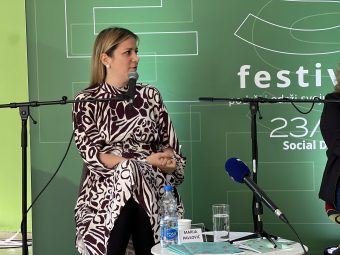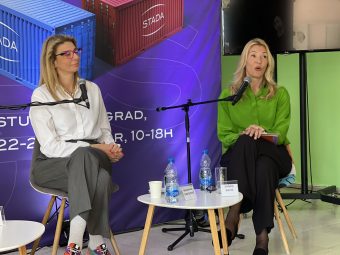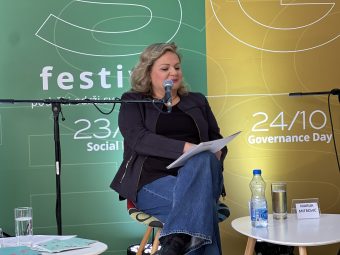Equality, inclusion, and gender equality remain topics that require open dialogue. The issue of how women in Serbia are discriminated against, especially in the labor market, was discussed at the gender equality panel during the ESG Festival, organized by Hemofarm and the University of Belgrade. This event brought together five prominent women, whose dedication and work have led them to successful careers. Their experiences and insights into society provided valuable information and inspiration to the panel participants.
The panelists emphasized the importance of finding balance, highlighting that this is a broad concept that varies for each individual. Marjana Davidović, General Manager for the Southern Adriatic Region at Nestle, stressed that women should embrace their roles in society and the expectations that come from family, children, and partners, as it is impossible to change the entire environment around us. However, she added that it is essential for every woman to find her personal balance and accept that it is okay if things are not always perfect.

Sandra Savić, Senior Director of Corporate Affairs and Communications at Hemofarm, opened the discussion on women’s participation in science with a statement by António Guterres on International Women’s Day: “At the current pace, it will take 300 years to achieve gender equality.” Guterres pointed out that in the field of innovation and technology, men are once again taking the lead. Marija Pavlović, a representative of Bio4Campus from the Ministry of Science, Technology, and Innovation, added statistical data from the Ministry and eScience, indicating that about 55 percent of scientists are women.
“If we look at the STEM fields, which include science, technology, engineering, and mathematics, and the institutes within the University of Belgrade that fall under these areas—of which there are 11—eight of them are led by women,” Pavlović said.
She further emphasized the benefits of gender-equal, balanced teams compared to those that are not.
Brankica Janković, Commissioner for the Protection of Equality, noted that progress has been made, reporting that women’s interest in STEM fields has grown. The percentage of women in these fields increased from 21 percent in 2011 to 32 percent in 2021.
She highlighted the importance of role models for girls and young women, pointing out that the presence of women in science and in leadership positions serves as inspiration.
Although progress has been made, women remain the most discriminated group, particularly in the labor market. A closer look reveals that women over the age of 45 are the most affected.
According to official data from the National Employment Service, presented by the Commissioner for the Protection of Equality, while unemployment rates have significantly decreased, the employment situation for women over 45 has remained unchanged. She cited the lack of support for women as the primary reason. Although these women have developed various skills through caring for their families, children, and elderly members, they often lack the skills currently required in the labor market. The Commissioner emphasized the need for the National Employment Service to offer programs to help women prepare for re-entering the workforce.

“Just because they are not familiar with the business culture in demand today does not mean they cannot learn it. They need to overcome internal barriers,” Janković concluded.
Marija Mitrović from the Trag Foundation said that women over the age of 50, unless they have built a solid career, become practically unemployable, even though they remain part of the workforce.
The panelists also discussed young women and those from rural areas. Mitrović noted that women from rural areas are often discouraged from pursuing higher education, leaving them with only secondary school qualifications, which leads to lower-paid and less qualified jobs.
When it comes to young women, the panelists agreed that motherhood remains a significant issue. Discrimination is evident in how employers assess whether women are at an age to have children, which influences hiring decisions. The Commissioner for the Protection of Equality also mentioned cases where women are dismissed or demoted upon returning from maternity leave. The General Manager of Nestle pointed out that although many employers now know what they must not say, such as asking about family planning, it takes time for society and individuals to internalize these values.
The panelists agreed that in order to foster both career growth for women and motherhood, population policies must focus on improving childcare facilities and the conditions within them. When deciding to become mothers, women need more than one-time financial assistance—they require job stability and the reassurance that they have support throughout their careers. Davidović shared an example from Switzerland, where kindergartens operate only from 10 a.m. to 2 p.m., making it challenging for working parents to manage drop-offs and pick-ups. She added that the situation is better in Serbia, and this is the kind of support women need from society.

To achieve further progress in gender equality, Davidović stressed the importance of raising children to support their partners. Solidarity, she said, was the theme that concluded the panel. The panelists emphasized that solidarity starts from within and is learned throughout life, from family to the workplace. They encouraged women to overcome insecurities and fears of failure. The Commissioner for the Protection of Equality added that there is a need for more male role models who are not afraid to speak openly about these issues. Pavlović concluded by saying that true solidarity comes from within. “Competing with others is not solidarity. When each person competes with themselves and is genuinely aware of it, they will give their best, and solidarity will naturally follow as a societal state.”

